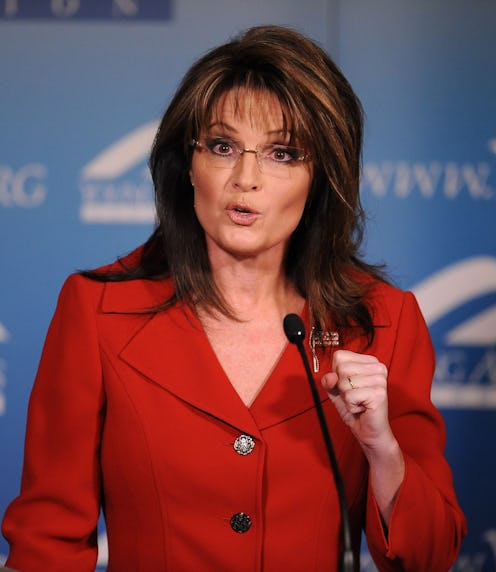News
Sarah Palin & The Tea Party's End. Is Trump Next?
Stumping in Wisconsin last week, Sarah Palin was supposed to help Donald Trump when she delivered a speech at a fundraising dinner ahead of Tuesday's primary. Instead, her remarks — which she (shocker!) hadn't pre-prepared — have been called truly "bizarre," a mishmash of buzzwords, or, as U.S. News and World Report described Palin's strange speech, "word salad." Those who watched Palin in her prime back in 2008 are intimately familiar with the way she weaves through fearmongering untruths, cliches, and creepy almost-rhymes, but it seemed like this speech included so many Palinisms that it might've been mistaken for a Saturday Night Live sketch.
Palin's sing-songy, colloquial style is undoubtedly a field day for tortured linguists everywhere, but it still wasn't enough to deliver our nation's cheesiest state to Trump. Many believed that Palin's endorsement of Trump earlier this year could help the real estate mogul earn some political credibility from the remaining GOP skeptics. After all, the former governor of Alaska became a Tea Party darling early on as the archetypal outsider taking on the establishment — a hockey-mom-turned-local-politician-turned-national-politician. Unfortunately for Trump, that wasn't the case in Wisconsin.
The rhetoric of the Tea Party — promises to put an end to career politicians and to guard the financial and social interests of the working class conservative (wrapped in an aggressively anti-intellectual "aw, shucks" package) — is given a lot of credit for the rise of Trump's campaign. But is that salt of the earth sensibility actually enough for today's GOP voter?
The Washington Post's Aaron Blake wrote in February about the "Tea Party Freshman Class" — the cutesy nickname used to describe the 84 Republican newbies who joined the House after the 2010 midterm elections. They're the not-politician politicians — a surgeon, a farmer, a car salesman — and they're representative of the "I'd have a beer with him" sensibility that won George W. Bush favor back in 2000. They're also credited by some political analysts with pushing the partisan inaction that's defined Congress in recent years. And a number of them are actually leaving. They're tired of the regular Washington squabbles, and they're missing their old work and families, and, no doubt, they're itching to be out of the political game that they so obviously hated.
Virginian Republican Rep. Scott Rigel talked about his personal experience as part of the Tea Party exodus from Congress to NPR:
I think, for many of us in my class, it truly wasn't on the bucket list of life to be here. It wasn't as if I was a junior in high school saying, 'I want to be a member of Congress.'
The exit of many of these freshman also raise questions as to whether an outsider — the beer-buddy, the businessman, the decidedly unpolitical figure — can really cut it as a policymaker.
As one watches Palin fumble through lines like "... the shifting and sifting and the exposing of this rabid bite for them to hang on to any kind of relevancy and to hang on to their gravy train," or "trashin’ our economy, shippin’ out jobs, lettin’ us foot the bill, palin’ around with the same old politicos and insiders" with promises to "reload," it's almost difficult to imagine the power the Tea Partiers had — and still technically do have — in our government. The folksy, unpolished rhetoric is one thing, but it opened a door to a new age of politics in which a lack of finesse, diplomacy, or a willingness to cooperate is somehow a selling point.
No doubt Ted Cruz has benefited from some of these Tea Party changes. However, Trump may be the ultimate embodiment of the Tea Party in this GOP race. What will happen if/when we finally see an "outsider" by the Tea Party's definition in our highest office? I hope we never find out. And if the results of the Wisconsin primary are predictive, we may not have to.
